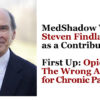(Ed’s note: Please note that hormone therapy is not recommended by any medical organizations for prevention of chronic disease, such as heart disease, diabetes or cancer, but remains a first-line recommended treatment for menopausal symptoms. See the bottom of the article for a recent update to USPSTF recommendations on this topic.)
When Wendy Haaf began having hot flashes in her sleep and night sweats at 47 years old, the sleep deprivation they caused began taking a toll.
“Not only was I tired and having difficulty focusing, but I think it added to my overall stress level, which in turn made me irritable,” Haaf said. She was also experiencing such heavy periods that it was lowering her iron levels.
Making the Choice
Her family doctor gave her a couple of choices: a birth control pill or a natural preparation with clover and other plants that would deliver a lower dose of hormone therapy — perhaps so low that it might not be therapeutic, he told her. The choice was a common one offered to women: a more traditional hormone therapy versus compounded bioidenticals.
Haaf opted for the birth control pill and quickly saw a reduction in heavy periods and nighttime hot flashes. Seven years later, when she was menopausal, she visited her gynecologist and switched to a low-dose hormone therapy (HRT). She chose HRT over bioidenticals because she wanted to be sure the product worked, and because more data existed on HRT. She acknowledged that the data on HRT is more nuanced than once thought, but she hasn’t seen evidence that bioidenticals are any safer.
“We have a lot more data on the risks and benefits of the meds that are used for HRT than we do on natural products and bioidenticals,” she said. She also suspects a lot of misinformation and false claims exist about various natural products.
“The pharmaceutical industry and the clinical trials process do have their flaws, but the natural products/alt med industries are like the Wild West,” Haaf said.
While Popularity Surges, Research Lags
She’s not far off, based on what the medical research shows to date. The popularity of bioidenticals has surged over the past decade, particularly among women with safety concerns about HRT during and after menopause. Yet many women may not realize how little research exists on these products’ safety, effectiveness, purity, strength or quality. In fact, the risks of bioidenticals are pretty much the same, or sometimes possibly greater, than taking regular FDA-approved HRT products.
The biggest concern with bioidenticals is safety. One survey found 71% of women believe “natural hormones” have fewer or no risks, and 69% thought they had fewer or no side effects. Yet bioidenticals haven’t been studied enough to show safety. Chemically, they would be expected to have the same risks as FDA-approved hormone therapies — but they aren’t required to carry the same Black Box warnings as FDA products, even if the risks are the same.
Bioidentical are hormones that can be derived from plants, synthetically produced or altered to have a similar chemical structure as hormones produced by the body. They may also contain FDA-approved hormone products. Little to no regulation controls bioidenticals’ production and distribution. Bioidenticals can be ordered online or compounded at pharmacies using a healthcare provider’s instructions, but the FDA does not regulate most of these products because they’re considered supplements. The agency leaves regulation of compounded formulations with FDA-approved products to the states.
Many women are concerned about HRT risks and have opted for bioidenticals, which include forms of estradiol, estrone and estriol estrogens plus progesterone optimized (“micronized”) for better absorption. Past surveys found one of the biggest reasons women choose bioidenticals is their belief that the products are natural or made “without chemicals.” But that’s not the case. Even plant-derived bioidenticals are usually altered in the laboratory to make them similar to human hormones, and all of them are made up of chemicals. [For an in-depth examination of the risks of HRT, read Does HRT for Menopause Deserve Its Bad Rap?]
The term “bioidentical” is a marketing term rather than a scientific one, explains the American College of Obstetricians and Gynecologists (ACOG). The hormone therapy products approved by the FDA come from both plant and animal sources and are equally as “natural” as bioidentical products. The biggest difference between FDA-approved hormone therapy products and bioidenticals is that bioidenticals are unlicensed and not tested for safety or effectiveness. Unlike FDA products, bioidenticals also aren’t tested for purity and consistent potency.
‘I knew there was risk, but I opted for the cream over pills, which came with a level of risk I was comfortable with.’
Women may also choose bioidenticals for their individualization. For example, a doctor may prescribe a compounded formulation instead of an FDA-approved product containing peanut oil if the woman has a peanut allergy. Beyond these cases, however, “hormone customization is very difficult to achieve because blood hormone levels are difficult to measure and regulate accurately due to normal physiologic variations,” the Endocrine Society wrote in their statement on bioidenticals.
Finding the Right Dose
Some providers use saliva or blood tests to assess hormone levels, but research has shown these tests are unreliable and cannot accurately measure levels. Further, the body cannot tell the difference between bioidentical hormones and ones made by the body, so tests cannot tell how much bioidenticals are absorbed. Some bioidenticals even use plant sources, such as Mexican wild yam, that produce estrogen the human body isn’t capable of using. Because these levels cannot be tested and the products aren’t tested, women can also receive underdosed or overdosed amounts. Overdosage can increase the risk of abnormal endometrial cell growth, endometrial cancer and blood clots.
Neither ACOG nor the Endocrine Society say women shouldn’t take bioidenticals. Both organizations emphasize the importance of informing women of the risks and the lack of scientific evidence for bioidenticals’ safety and effectiveness, and both call for greater regulation of these substances, especially given their continued popularity and similar risks to hormone therapy.
Their statements apply not only to women experiencing normal menopause but also those who experience early menopause, such as Mary Clare Bietila, who was diagnosed with acute myeloid leukemia at 37 years old. Although high-dose chemotherapy and a stem cell transplant saved her physical life, they destroyed her sex life by bringing on early menopause.
“My primary symptoms were painful sex and vaginitis,” Bietila said. “I lost my sex life with my husband just as my life was coming back together. The lack of physical closeness was damaging to our relationship.”
She was most worried about cancer returning, so the idea of taking hormones scared her at first, even though her cancer had not been hormone-based. After learning about her pharmaceutical and non-pharmaceutical options, she chose Estrace, an estradiol vaginal cream. Despite her initial fear, she said she would make the same choice again.
“It has made a significant change in my sex life and libido,” Bietila said. She said bioidenticals hadn’t been discussed and likely wouldn’t have been covered by her insurance anyway, which was a deal-breaker.
“I knew there was risk [with HRT], but I opted for the cream over pills, which came with a level of risk I was comfortable with,” Bietila said.
Some Notes About Hormone Replacement Therapy
Editor’s Note: The USPSTF (US Preventive Task Force) recently updated its recommendations to advise against the use of combined estrogen and progestin for the primary prevention of chronic conditions in postmenopausal women, such as heart disease, stroke, diabetes and cancer. This update puts their recommendations in line with those of ACOG and other professional medical societies.
Hormone therapy continues to be recommended as the first-line treatment for women experiencing bothersome menopausal symptoms, such as hot flashes, sleep disturbances, urinary problems, vaginal dryness and decreased libido. A variety of different hormone therapy formulations in pills, topical products and creams are available to treat these menopausal symptoms.
The USPSTF, like other medical organizations, also recommends against the use of estrogen alone for the primary prevention of chronic non-menopausal conditions in postmenopausal women who have had a hysterectomy. Women who are experiencing menopausal symptoms that interfere with their everyday lives should discussing the benefits and risks of hormone therapy with their doctor.






